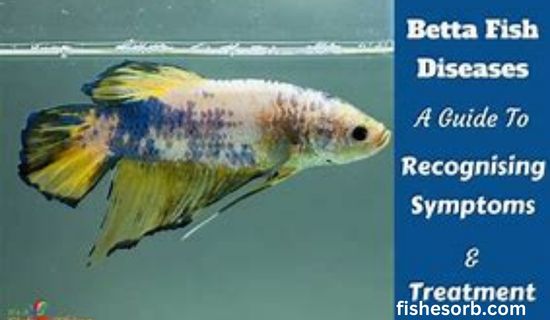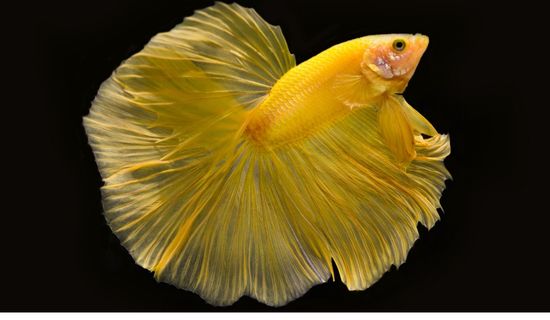Female Betta fish, like their male counterparts (male bettas) , can experience a range of health issues. It’s important to be aware of these common problems and how to prevent and treat them, especially if you’re a beginner in fish keeping.
> Common Health Issues in Female Betta Fish and How to Prevent It in 2023

> Fin Rot female betta disease

Formation of fin rot: Fin rot cause by poor water quality, which stresses the fish and makes them susceptible to bacterial and fungal infections. It may also result from physical injury or aggressive tankmates nipping at the fins.
Description: Fin rot is characterize by the progressive deterioration of the fish’s fins. The fins may appear ragged, discolored, or even shredded.
Prevention from Fin Rot: Maintain clean water conditions by changing 25-30% of the water every two weeks. Avoid overfeeding and ensure a balanced diet.
Early Detection: Look for ragged or rotting fins. Fin rot is often caused by poor water quality.
Treatment: Isolate the affected fish and use aquarium salt or medication recommended for fin rot.
> Ich (White Spot Disease) a female betta disease
Formation of Ich: Ich, or white spot disease, is caused by a parasitic protozoan. It thrives in stressed fish and often appears when the temperature fluctuates or the immune system is compromised.
Description: Ich presents as small white cysts or spots on the fish’s body and fins. It may cause the fish to scratch against objects.
Prevention from it: Keep the water temperature stable and maintain good water quality.
Early Detection: White cysts or spots on the body and fins.
Treatment: Raise the temperature to 82-86°F (28-30°C) and treat with aquarium salt or an anti-parasitic medication.
> Constipation female betta disease

Formation of constipation disease: Constipation in Betta fish typically results from overfeeding, a diet lacking in fiber, or an inability to digest food properly. Some fish may gulp in the air when feeding, leading to buoyancy issues.
Description: A constipated Betta may have a swollen abdomen, lose its appetite, or produce abnormal feces.
Prevention from it: Offer a varied diet and avoid overfeeding. Include occasional live or frozen foods.
Early Detection: Swollen abdomen, lack of appetite, or abnormal feces.
Treatment: Feed a small, peeled, cooked, and mashed pea to help with digestion, or use specially formulated Betta fish food with added fiber.
>Dropsy female betta disease

Formation of dropsy disease: Dropsy is often a symptom of an underlying issue, such as bacterial, viral, or parasitic infections, or organ failure. It leads to fluid retention and swelling.
Description: The fish appears bloated with raised scales, like a pinecone. It may also show signs of lethargy and loss of appetite.
Prevention: Maintain good water quality and avoid overcrowding.
Early Detection: Swollen body, raised scales, and overall bloating.
Treatment: Isolate the affected fish, use Epsom salt, and consult a vet or experienced aquarist if the condition worsens.
> Fungal infections Female betta disease

Formation of fungal infection disease: Fungal infections typically occur in fish with damaged skin or fins. The fungus is opportunistic and establishes itself when the fish’s immune system is weakened.
Description: Fungal infections manifest as cotton-like growths or patches on the fish’s body or fins, which can quickly spread.
Prevention: Ensure clean water and avoid overcrowding.
Early Detection: Cotton-like growths or patches on the fish’s body or fins.
Treatment: Isolate the affected fish and use an antifungal medication as directed.
> Lethargy or Stress female betta health issue

Formation: Stress can result from various factors, including poor water quality, overcrowding, inadequate hiding places, or incompatible tank mates. Betta fish are particularly sensitive to these stressors.
Description: Stressed fish may become lethargic, lose their vibrant coloration, clamp their fins close to their body, and may exhibit erratic behavior.
Prevention: Maintain a stable and appropriate water temperature and provide hiding spots in the aquarium.
Early Detection: Unusual lethargy, loss of color, or clamped fins.
Treatment: Check water parameters, make sure they’re within acceptable ranges, and provide a calm and stress-free environment.
> External Parasites(Ichthyobodo, Argulus, etc.)
Formation: External parasites are introduced into the aquarium through new fish or plants. They attach themselves to the host fish’s skin and feed on their bodily fluids.
Description: Fish infested with external parasites may scratch their bodies against objects in an attempt to dislodge the parasites. Parasites like anchor worms or fish lice may be visible on the fish’s skin.
Prevention: Quarantine new fish and plants before introducing them to your tank.
Early Detection: Scratching against objects, and visible parasites (such as anchor worms or fish lice).
Treatment: Isolate the affected fish and treat it with an appropriate anti-parasitic medication.
Keep in mind that keeping your Betta fish healthy starts with maintaining a clean aquarium. You should regularly change the water, make sure to feed them properly, and keep an eye on their health. If you notice any problems with your fish, it’s a good idea to talk to someone who knows about fish care, like an experienced aquarist or a vet.
conclusion
In conclusion, female Betta fish, like their male counterparts, can be susceptible to various health issues. To ensure the well-being of your female Betta fish, it’s crucial to be aware of these common problems and understand how to prevent and treat them, especially if you’re new to fishkeeping.
Additional Resources
For further readings about male and female betta fish you can explore given links:
- Female Betta Health Issues and How to Prevent guide for beginner
- Tips for Successful female Betta Fish Breeding for beginners
- Breeding Female Betta Fish complete guide for beginners
- Female Betta Tank Mates complete guide for beginners
- Feeding Female Betta A comprehensive lead for your female betta
- Complete guide about water filtration and heating for female Bettas
- Water Parameters and Maintenance for Female Betta Fish
- Female Betta Fish Habitat A Complete Guide for Your Female Betta in 2023
- Selecting the Right Tank for Female Betta Fish in 2023
- Male Betta Fish A Step-by-Step Beginner’s Guide in 2023
- Betta Fish Tanks A Comprehensive Guide for Happy Bettas in 2023
- Male Betta Fish Tank Decor Ideas in 2023
- Betta Fish Life span Tips for Long-Lived Pets
To learn more about Betta fish health and care, consider the following resources:
Remember, maintaining a clean and suitable aquarium environment, along with proper feeding and vigilant health monitoring, are key to keeping your Betta fish happy and healthy. If you encounter any issues, seek advice from experienced aquarists or consult a vet who specializes in fish care.




Pingback: Female Betta Fish A Step-by-Step Beginner's Guide
Pingback: Tips for Successful female Betta Fish Breeding for beginners
Pingback: Breeding Female Betta Fish complete guide for beginners
Pingback: Female Betta Tank Mates complete guide for beginners
Pingback: Feeding Female Betta A comprehensive lead for your female betta
Pingback: Complete guide about water filtration and heating for female Bettas
Pingback: Water Parameters and Maintenance for Female Betta Fish
Pingback: Selecting the Right Tank for Female Betta Fish in 2023
Pingback: Male Betta Fish A Step-by-Step Beginner's Guide in 2023
Pingback: Betta Fish Tanks A Comprehensive Guide for Happy Bettas in 2023
Pingback: Betta Fish Tank Decor Ideas in 2023
Pingback: The Guide to Betta Fish Life span: Tips for Long-Lived Pets
Pingback: Complete guide about water filtration and heating for female Bettas
Pingback: Unveiling the Mysteries of the Florida Scorpion Fish.
Pingback: A Comprehensive Guide to Top-Quality Aquarium Supplies
Pingback: Fish Medications: Your Comprehensive Guide
Thank you for your sharing. I am worried that I lack creative ideas. It is your article that makes me full of hope. Thank you. But, I have a question, can you help me?